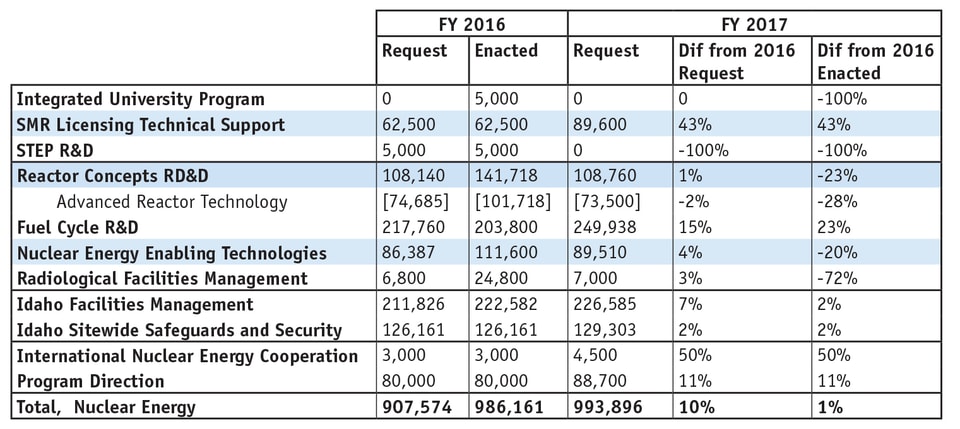Memo Published March 8, 2016 · Updated March 8, 2016 · 6 minute read
FY2017 Budget Impacts on Advanced Nuclear
Amber Robson & Ryan Fitzpatrick
Third Way strongly supports advanced nuclear energy as a way to safely and reliably meet our energy needs while helping in the fight against climate change. The Obama Administration has also been very supportive of nuclear innovation, raising its profile in the U.S. and internationally. While we are grateful for the leadership the Administration has shown on this issue, President Obama’s recently proposed FY2017 budget misses some important opportunities to further promote advanced nuclear development.
This memo highlights elements of the FY2017 budget proposal that could have the greatest impact on advanced nuclear reactors. In particular, it reviews activity in the Department of Energy’s (DOE) Office of Nuclear Energy (NE) and in the Nuclear Regulatory Commission (NRC) budgets. Most notably, the FY2017 budget proposal would:
- Provide a slight increase of $8 million (0.8%) for the overall NE budget, compared to the funding level appropriated by Congress in FY2016;
- Reduce funding for programs that support advanced nuclear research, compared to FY2016 appropriated levels;
- Continue supporting the licensing of small modular reactors (SMRs) with a $90 million allocation; and
- Add $5 million to the NRC budget to help the Commission prepare for eventual licensing of advanced reactor designs.
Table 1: Summary of Requested and Enacted Budgets, FY 2016 to FY 2017, for Department of Energy, Office of Nuclear Energy, ($ in thousands).

Small Modular Reactors (SMRs) are nuclear power plants that are smaller in size than the current generation of nuclear power plants. These compact designs can be built in a factory and transported by truck or rail to a nuclear power site. If SMRs can be commercially deployed within the next decade, they could play an important role in addressing the country’s energy security, economic, and climate goals.
The SMR Licensing Technical Support program helps offset costs associated with first-of-a-kind design certification and licensing activities through cost-shared arrangements with industry (industry contributions are a minimum of 50% of the cost). The goal of the program is to support “first-movers” in the industry as they complete the design development, certification, and licensing processes for SMRs to be deployed in the early to mid-2020’s. DOE initiated this program in 2012 and has since entered support agreements with two companies, mPower and NuScale. Although mPower withdrew its participation in the program, NuScale will continue to receive funding through 2017.
The budget request proposes an increase in funding for the SMR program, from $62.5 million in FY 2016 to $89.6 million in FY 2017. This indicates the administration’s commitment to complete the NuScale design certification with the NRC as well as site permitting and licensing work. The FY 2017 amount will complete the funding commitment to this program.
Bottom Line: The additional funding proposed for FY 2017 will ensure that NuScale completes the licensing process —bringing their SMR design closer to commercialization, and laying the groundwork for licensing of future SMR designs. Congress should support the requested funding level, and should consider replicating the structure of this successful program for other advanced reactor designs in the future.
Reactor Concepts RD&D
NE’s focused research on advanced reactor technologies takes place through the Office of Advanced Reactor Technologies (ART). Research at ART aims to drive advancements in safety, economics, and environmental performance of innovative advanced technologies. This includes research on advanced reactor coolants, advanced instrumentation and controls, advanced materials development, and supporting the NRC with advanced reactor licensing. R&D efforts are mainly focused on fast reactors using liquid sodium coolant and high temperature reactors. [For a quick refresher on the various types of advanced reactors, take a look at our “Advanced Nuclear 101” memo.]
Funding for ART is seen in the budget line item titled “Advanced Reactor Technologies” under “Reactor Concepts RD&D”. The FY 2017 request for ART, $73.5 million shows a significant decrease from the FY 2016 enacted amount of $101.7 million (-28%).
Bottom Line: Considering the recent Mission Innovation commitment to double down on Clean Energy research, we would hope to see an increase in funding levels for this program in FY 2017 and beyond.
Nuclear Energy Enabling Technologies
The Nuclear Energy Enabling Technologies (NEET) program sponsors R&D and strategic infrastructure investments to develop crosscutting nuclear technologies. This program provides computational tools for reactor simulation and enables external researchers to access DOE’s nuclear energy capabilities.
In November 2016, the Administration announced the Gateway for Accelerated Innovation in Nuclear (GAIN) program, whose goal is to make DOE’s facilities, scientists, laboratories, and knowledge more accessible to entrepreneurs and scientists working on advanced nuclear technologies. This includes making a nuclear energy infrastructure database available to companies and providing them assistance in navigating the regulatory process. Under the NEET program, $2.185 million has been proposed for GAIN, of which $2 million is set aside for vouchers that will help entrepreneurs pay for the work they do at DOE’s labs. This leaves just $185,000 to further develop and administer the actual GAIN program. GAIN will also rely on other areas of the overall NEET program, which saw a decrease from $111.6 million enacted in 2016 to the $89.5 million in the 2017 request (-20%).
Bottom Line: With its announcement of the GAIN program, the White House has outlined a critical step it can take to help the private sector develop advanced nuclear technologies. The Obama Administration should be commended for recognizing this opportunity and taking action. However, the amount of funding proposed for this important program is extremely modest, especially considering the scope of work that has been outlined for GAIN and the sizeable decrease for the other supporting programs within NEET.
Nuclear Regulatory Commission Budget, FY 2017
The NRC Office of New Reactors is responsible for advanced reactor licensing support. In previous years, the NRC budget for advanced reactor support was so minimal that it was not highlighted in budget activities. This year marks a very important step forward, as the President’s budget request includes $5 million for work to develop the regulatory infrastructure for advanced reactor technologies in support of the Mission Innovation initiative.
Bottom Line: Third Way has continuously advocated for a funding increase for NRC to support advanced nuclear licensing. The proposed funding would be a significant victory for nuclear innovation, and should be supported at the requested level.

